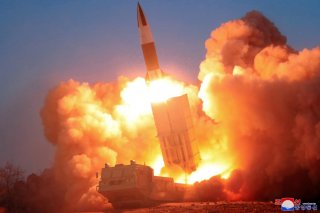The U.S. Military Doubts North Korea Will Give Up Its Nuclear Weapons
The Biden administration’s nominee for commander of U.S. Forces Korea (USFK) said recently that he believes North Korea is unlikely to give up its nuclear weapons arsenal and production capabilities, and will continue to develop its strategic weapons program.
The Biden administration’s nominee for commander of U.S. Forces Korea (USFK) said recently that he believes North Korea is unlikely to give up its nuclear weapons arsenal and production capabilities, and will continue to develop its strategic weapons program.
U.S. Army General Paul LaCamera, who currently serves as commander of United States Army Pacific (USARPAC), said in a statement ahead of a May 18 hearing before the Senate Armed Services Committee that North Korea has not yet taken any steps towards denuclearization, and he believed economic sanctions alone would not be sufficient as a means to achieve that goal.
“Economic sanctions must be combined with a whole-of-government approach, including all elements of national power and the international community to convince the [North Korean] regime to return to meaningful negotiations,” said General LaCamera, who added that he was unsure what would successfully encourage or pressure North Korea to denuclearize, but did say that maintaining a credible and combat ready military force on the Korean Peninsula remains central to United States’ ability to negotiate with North Korea from a position of strength. General LaCamera also referenced North Korea’s growing arsenal of ballistic missiles such as those unveiled during an October 2020 military parade in Pyongyang, including North Korea’s newest model of intercontinental ballistic missile (ICBM). In recent months, North Korea has also unveiled a new model of submarine-launched ballistic missile (SLBM), and has tested a short-range ballistic missile (SRBM).
General LaCamera’s belief that North Korea is unlikely to abandon its nuclear weapons is one that is shared by a number of North Korea and foreign policy experts. Other elements of the U.S. government have also signaled a belief that North Korea will not give up all of its nuclear weapons, with the intelligence community in particular taking such a position. This has led to calls for a new U.S. approach to dealing with North Korea that moves away from a focus on denuclearization and instead looks to better address the threat posed by a nuclear armed North Korea.
The Biden administration recently completed its review of U.S. North Korea policy, and has revealed some details about its resulting North Korea policy. The policy retains denuclearization as an ultimate goal – though the administration has consciously tried to differentiate its policy from those of previous administrations – and will involve a phased approach in which the United States trades partial sanctions relief in return for North Korean steps towards denuclearization.
President Joe Biden is set to host South Korean President Moon Jae-in for a summit meeting beginning today, during which the two leaders are expected to discuss a number of topics, including North Korea.
Eli Fuhrman is a contributing writer for The National Interest.

